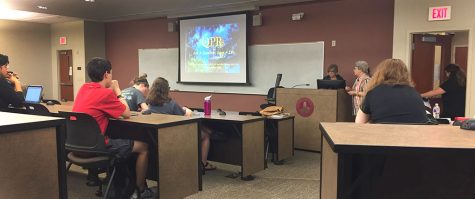26 students attend workshop for suicide intervention
September 18, 2018

Students listen to professional counselor Vikki L.Chaviers at the training workshop for suicide intervention in Dillard on Sept. 18.
Approximately 26 students attended the bi-annual training workshop for suicide intervention offered by the Counseling Center on Sept. 18 from 3-4 p.m. in the Dillard College of Business.
McKenzie Holland Wiese, nursing sophomore, said, “It was influential [considering] students are under stress in college.”
Students were told to recognize warning signs for them to respond by taking action or getting others involved, and then to make a referral.
Licensed professional counselor Vikki L. Chaviers said, “Become aware of the people you’re around all the time. People contemplating ending their life are in a dark place.”
A QPR Institute booklet by Paul Quinnett was distributed to students who attended the workshop. The “question, persuade, and refer” tactic is not a form of counseling or treatment, but it can offer hope through positive action.
“With more people trained, it is less likely that MSU will have someone committ suicide on or off campus,” Chaviers said regarding why this workshop is offered.
According to the QPR Institute, a gatekeeper is anyone who is able to identify the warning signs that a person is contemplating suicide. Suicide is a difficult topic to discuss but discussion saves lives.
“Generally suicidal people don’t keep their plans to themselves,” said Chaviers. “That no one can stop suicide is a myth.”
Warning signs can either be direct or indirect verbal clues, behavioral clues, or situational clues.
“Take indirect clues seriously. It’s evident they’re crying out for help,” said Licensed Professional Counselor Laurel Clement. “Don’t discount clues without threats though.”
Asking someone if they are thinking about suicide does not increase their risk. Be willing to listen to the person and wait for them to agree to get help.
“First, recognize they’re hurting,” said Clement. “It gives them hope. Bring it up and make it okay to talk about.”
A primary symptom of untreated depression is feeling suicidal. This is a medical condition that has effective treatment available.
“Let them talk until they talk themselves out. Give them and yourself plenty of time. There may be silence,” said Chaviers.
“See it as you’re giving them a safe place with that silence,” Clement said. “If someone is in immediate harm, keep them safe. We’re a part of a team. You’re where we can’t be [on campus]. So, thank you.”




